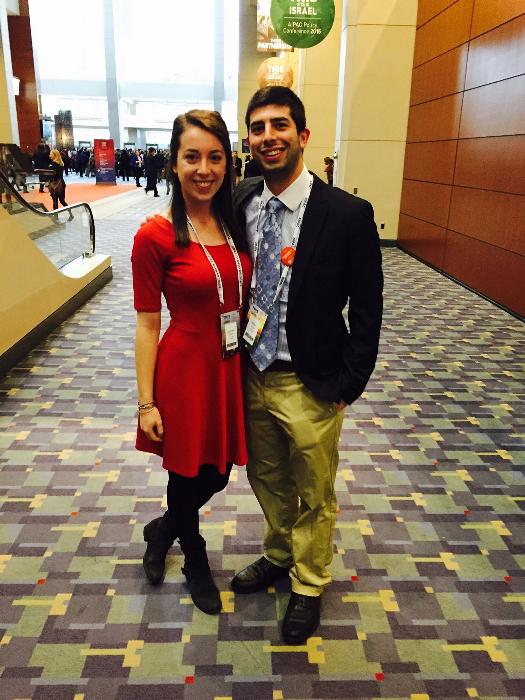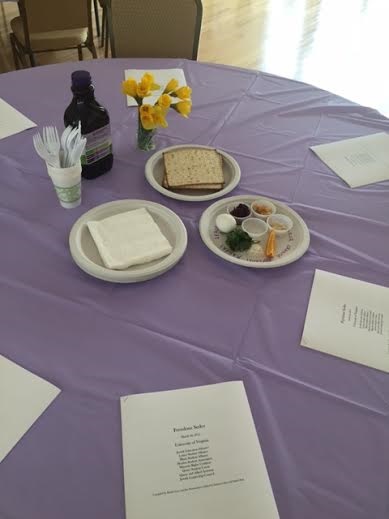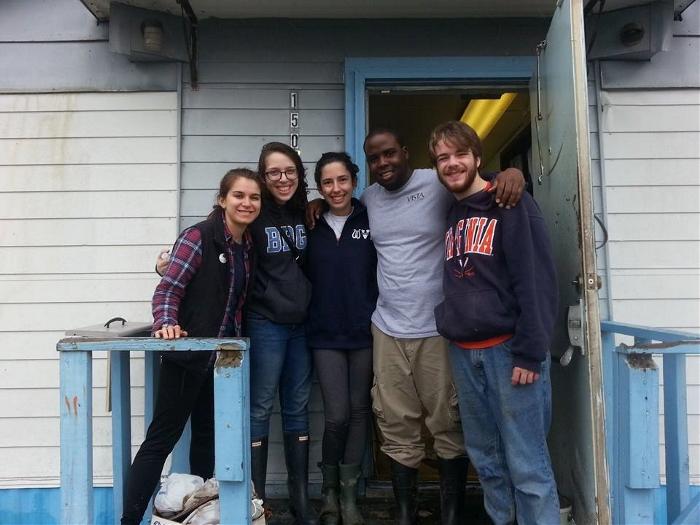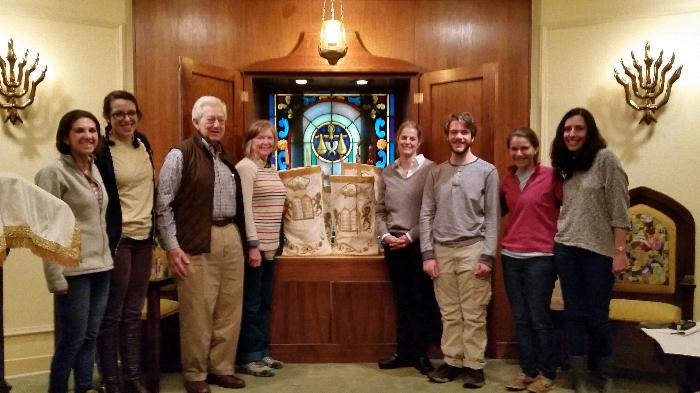Not only are there riveting lectures to go to at any moment, but also the amount of interactions and connections that happen between attendees of the conference is enormous. Young and old attend AIPAC’s policy conference, making it one of the most incredible sites of playing the game of Jewish geography. With so many like-minded people, many of whom know each other due to the widespread nature of the Jewish community, this conference ignites a hugely uplifting feeling of solidarity for Israel and unity.
During the third day of the conference, all 15,000 attendees are mobilized to Capitol Hill where they lobby their Congressmen directly. This deployment of pro-Israel activists to the offices of Representatives and Senators symbolizes the huge impact of AIPAC’s work. Not only does the organization employ professional lobbyers to get the pro-Israel voice heard in the legislative branch, it also empowers its members to act on their views. AIPAC’s policy conference is the best place to actively show support for Israel and exercise our rights as United States citizens to make sure Congress backs Israel, our treasured ally in the Middle East. Personally, I find AIPAC Policy Conference to be close to a cathartic experience. I am able to express my positions on Israel with like-minded people, as well as with passionate people who disagree with me. I am able to learn from and pose challenging questions to even the most well-known intellects. Finally, it is extremely rewarding to be able to march up to Capitol Hill with an agenda and be the voice for a Israel, a nation that means so much to me. -Jennifer Sachs Class of 2018
We had approximately 35 people attend the Freedom Seder, and JEI co-sponsored the event with the Black Student Alliance, Queer Student Union, Latino Student Alliance, Minority Squared, the Jewish Leadership Council, and various other student groups. The Seder included traditional Passover practices, such as reciting the Four Questions, but each ritual contained a social justice component as well. Pharaoh’s plagues were accompanied by ten modern day plagues, like HIV/AIDS and environmental destruction. The Seder Plate included an orange, to symbolize the acceptance of gays and lesbians at the Passover meal. And for every cup of wine (grape juice), we posed a discussion question so that those at each table could engage in conversation about different topics raised throughout the service. I found that everyone was very receptive to the dialogue. The luncheon that followed also gave people a change to continue discussing some of the Seder subjects, as well as an opportunity to lounge on the couch and watch UVA battle Michigan State in the NCAA tournament.
At the end of the Seder, we asked, “What can we do in our everyday lives to instill the change that we want to see in the world?” Issues, such as sexual assault and racial discrimination, to name a few that our community has faced this past year, demand that we tackle this question. I am proud that JEI was able to provide a platform, inclusive of various religious and racial identities, toward coming up with a cogent solution. As we are reminded during Passover, Jews were once slaves in the land of Egypt, but we are never truly free unless we demand human rights and civil liberties for all that share our space. -Emma Cohen, Co-Chair of the Jewish Education Initiative Class of 2015
The trip was well timed in another way as well. Although the congregants we met were passionate about their Jewish heritage and culture, the economic challenges of the Delta are increasingly driving young Jews (and other young people with the resources to leave) away from the region. The synagogues we visited were as beautiful as any I’ve seen in New York or in Israel, but the force of vacancies in the towns around them might eventually overcome the vivacity of Jewish life.
At Mississippians Engaged in Greener Agriculture, or MEGA, we learned how to care for chickens, build rabbit coops, and prepare soil for planting. We also worked in the food pantry, preparing boxes to be picked up. At first, the food pantry work confused me: MEGA aims to reduce diet-related illness by providing fresh fruits and vegetables, but we were handing out packages of processed foods, high-sugar desserts and low-nutrient canned goods, all donated by Wal-Mart. How could the food pantry and the garden outside be part of the same organization? Were they truly working toward the same goal? Over the course of the week, we were fortunate to be able discuss these questions. We realized that although healthful food is the ultimate goal, any food is better than no food. We also came to understand that the boxes handed out in early March, well before the harvest season, are not representative of those provided at other times in the year. Driving around the Delta, I was exposed to a part of American life that I had not seen up-close before. Growing up in one of the nation’s wealthiest counties and then moving to a college town, I’d never imagined towns where the majority of the stores were shut down, where the only place to get something to eat was at a gas station. I’ve also been fortunate to always have a sizable Jewish community around me. Before hearing the stories of Jews in Cleveland and Greenville, I couldn't imagine being the only Jewish student in school, or barely having enough Jewish adults in town to make a minyan. At the same time, I realized that the experiences of people in the Delta - both Jews and non-Jews - are not so different from mine. I have also had to make choices about maintaining Jewish customs or assimilating. I’ve also observed inequalities and racism. Many people we spoke with in the Delta asserted that Mississippi’s experience shines a spotlight on problems the entire United States faces. They said that their communities are not the only ones with injustices and lack of opportunity, but because the disparities are so great in Mississippi, the nation notices them more. Our local guides did not see this spotlighting as a problem - in fact, some maintained that the extra attention motivates Mississippians to make positive change, and that Mississippi leads the country in this initiative as well. Three nights after returning to Charlottesville, an incident of police violently arresting a black third year University student showed me the wisdom of those opinions. We cannot escape injustice by getting on a plane and leaving Mississippi. Right here in Virginia, less than a mile from my apartment, footsteps away from our beloved Grounds, a third year student was beat up by officers of the Virginia Alcoholic Beverage Control (ABC), presumably for trying to use a fake ID to get into a bar. I don’t know the specifics of the situation, so it would be unfair to say that Martese Johnson was beat up and arrested because he was publicly drunk, or because he is black. But I do know that on any given night on the Corner, and especially on a warm St. Patty’s evening, there are many students, black and white, 21 and underage, partying in the bars and belligerently drunk on the street outside them. I’ve never heard of an incident of police brutality on the Corner before - in fact, I am usually amazed at how little the local police respond to the underage drinking that occurs every night - so I have to wonder why this happened to Martese. It should not have happened to anyone. Martese’s story has shown me that we need to learn from the Mississippians we met and from the Jewish values of Tikkun Olam that we discussed last week. If we see injustices, we must work to resolve them. Violent acts like those in the video of Martese on the sidewalk cannot be tolerated, no matter the race of the people involved. Charlottesville, like the Mississippi Delta, has its own challenges, and we must all work to overcome them. -Sarah Hainbach Class of 2015
After an introduction and a tour, we got to work putting together boxes of food for the food pantry, which serves about 250 families a month in the area. We then moved on to feeding the bunny rabbits, and laying down leaves for the chickens, one of which hit Billy in the head!
After our day at MEGA and a quick change of clothes, we walked over to Temple Adath Israel, which is the synagogue in Cleveland, Mississippi. There we were able to meet a few of the congregants, who told us about their family histories, and their experiences of Jewish life in Mississippi. We then listened to a talk by Professor Jennifer Stollman, from the University of Mississippi, who gave us a more in depth explanation of the history of southern Jewish life. To round out the day some of the congregants of the temple served us a delicious dinner in true Mississippi style with barbeque chicken, chili, sweet tea, and brownies so good that we took the rest back with us! Sarah Hart |
The Brody Jewish Center, Hillel at the University of Virginia, is the focal point in a renaissance of Jewish life for the 1,000 Jewish students on Grounds. Archives
September 2021
Categories
All
|




 RSS Feed
RSS Feed